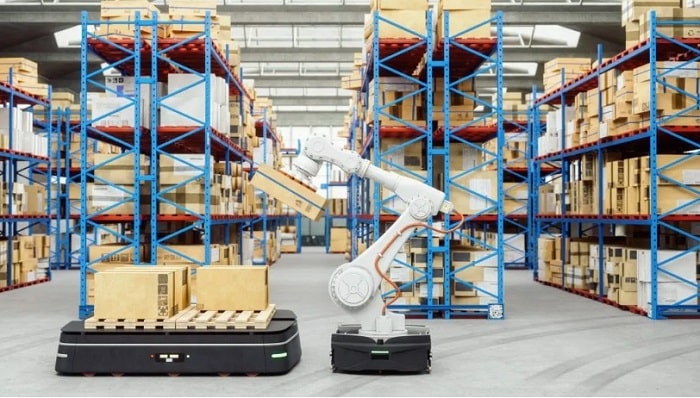Without a question, artificial intelligence (AI) and its more sophisticated offshoots, such machine learning (ML) and generative AI (Gen AI), are helping supply chain teams become more productive, make better decisions, and simplify processes.
However, these are only hazy illustrations of how this revolutionary technology is improving the supply chain environment and may be used in almost every corporate area or profession.
In this article, Supply Chain Digital examines a few particular applications of artificial intelligence in the supply chain and examines the main technology providers in this space to make sure businesses are using all of the resources available to them.
AI’s advantages for supply chains
Improved relationship management with suppliers (SRM)
AI can analyze supplier performance data to find patterns and trends, allowing businesses to choose suppliers on the basis of attributes like quality, price, dependability, and sustainability history.
Stronger, more reliable supplier relationships are often the outcome, which eventually leads to a more robust supply chain.
Improved forecasting of demand
Keeping with the data analysis theme, artificial intelligence (AI) may be used to analyze sales data, market trends, and external variables (such weather patterns or economic indicators) to estimate demand more precisely.
As a result, businesses are in a better position to prepare for the future since they can predict client demands and modify inventory levels to avoid overstock and stockouts.
Enhanced control over inventories
Thanks to AI-driven analytics, businesses may optimize inventory levels by anticipating precisely when and where their items will be most required. This is closely related to advances in forecasting and planning.
Once again, this satisfies consumer demands while cutting down on the carrying costs of extra inventory.
Total visibility
The capacity of AI to integrate data from many sources and provide businesses with end-to-end view of their supply chains is one of its greatest advantages.
Because of this, businesses are able to monitor products in real time, manage inventories across many locations, and—most importantly—respond swiftly to any disturbances.
Automating repetitive activities
It is often known that the capacity of AI to automate repetitive operations like order processing, invoicing, and inventory monitoring is one of the main reasons why so many large global businesses are investing extensively in the technology.
By doing this, the possibility of human mistake is eliminated, procedures are sped up, and staff members are able to concentrate on more strategic duties that improve operations.
Sustainability and its effects on the environment
One of the benefits of AI that is being addressed more and more is its potential to optimize operations’ logistics by optimizing routes, which lowers fuel consumption and emissions.
Additionally, it may support businesses in tracking and managing their environmental impact and complying with regulatory requirements, all of which assist in creating a more sustainable supply chain overall.
Accurate upkeep
AI’s ability to forecast when machinery or other equipment is going to break is a significant advantage since it enables businesses to schedule repairs before a breakdown actually happens.
In addition to possibly prolonging the lifetime of assets and reducing maintenance costs, this minimizes downtime and increases the length of time that operations may continue as usual.
Customization and client contentment
Customization is also another major benefit. Businesses may use AI to analyze client data and provide tailored services and suggestions.
Higher customer satisfaction and greater loyalty are a natural result of this improved client experience.
All-encompassing supply chain efficiency
AI systems are capable of analyzing a wide range of data, such as manufacturing schedules, delivery timelines, and shipping prices.
This aids businesses in determining the most economical and successful methods of transporting items from suppliers to consumers, resulting in overall supply chain network optimization.
Leading suppliers of AI for supply chains
Amazon Logistics
AWS’s supply chain division is working to provide end-to-end visibility and insights that lead the market by extending its artificial intelligence capabilities.
Supply chain managers may take use of a Gen AI assistant that summarizes the main risks related to inventory levels and demand volatility and illustrates the trade-offs between various scenarios using Amazon Q.
Diego Pantoja-Navajas, VP at AWS Supply Chain, stated in a recent interview with Supply Chain Digital: “Customers can ask Amazon Q in the AWS Supply Chain what is happening across their supply chains and receive intelligent, conversational answers to complex questions thanks to the power of Gen AI.”
C3.ai
C3.ai claims to have developed the first generative AI platform designed specifically for business use.
The company’s tried-and-true AI solutions, which have already revolutionized the operations of dozens of intricate organizations, are the foundation for C3 Generative AI.
In order to facilitate proactive management as opposed to reactive management of previous events, the larger C3 AI Supply Chain Suite provides an end-to-end family of predictive business AI apps for supply chain planning and execution.
SAP
SAP is using artificial intelligence (AI) in all of its supply chain solutions.
To assist procurement experts in developing thorough and efficient category strategies more quickly, this involves combining Gen AI technology with the SAP Ariba Category Management system.
Additionally, SAP is integrating Joule, its Gen AI copilot, into all of its cloud offerings, with plans to make it available in its spend management software soon.
Coupa
Clients are well-positioned to outwit interruptions, confidently balance trade-offs, and increase profits in their physical supply chains thanks to Coupa’s AI-driven optimization platform.
One of the most important features is the demand modeller, which is intended to improve the precision and efficiency of demand forecasting, planning, and modeling. Businesses may employ AI to provide richer context and more accurate demand forecasts by mixing internal and external data.
In the meanwhile, the supply chain modeller optimizes larger networks, inventories, and transit routes using AI.
Microsoft
With the introduction of its Copilot technology across its ERP portfolio, which includes Microsoft Dynamics 365 Finance, Dynamics 365 Project Operations, and Dynamics 365 Supply Chain Management, Microsoft has recognized several ways in which Gen AI may be used for critical supply chain operations.
Microsoft unveiled Microsoft Dynamics 365 Copilot in March 2023, launching the first AI copilot for ERP and CRM software globally. Interactive AI-powered support may revolutionize high-touch, tedious operations with Dynamics 365 Copilot’s next generation of AI capabilities.
Kinaxis
The core of Kinaxis’ recently released technology, Kinaxis Maestro (formerly called RapidResponse), is artificial intelligence.
Through quicker onboarding and more effective work, its AI-powered user experience increases productivity by assisting users in learning from documentation and best practices.
Users may easily examine and engage with data in new and straightforward ways with Maestro’s ability to build dashboards, scenarios, and much more.
Blue Yonder
Blue Yonder connects artificial intelligence (AI) with extensive knowledge of supply networks, enabling businesses to use AI-powered data synthesis and decision intelligence to dynamically manage their supply chains.
With its ground-breaking Gen AI capacity, Blue Yonder Orchestrator accelerates supply chain orchestration and fosters intelligent decision-making.
The technology synthesizes data-driven insights for better decision-making by fusing the natural language processing capabilities of huge language models with the intellectual property of businesses in their supplier chains.

































